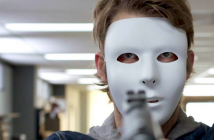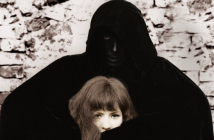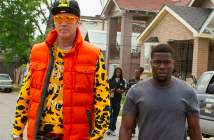The Barefoot Artist (2014)
Cast: Lily Yeh
Director: Glenn Holsten, Daniel Traub
Country: USA | China | India | Kenya | Rwanda
Genre: Documentary | Biography | Family | History
Official Site: Here
Editor’s Note: The Barefoot Artist opens in New York at the IFC Center on December 5.
It seems that every time I come to review a documentary, I have the urge to expound on the virtues and potential great fortune of the medium. For like any genre of film, documentary has the ability to transcend mere entertainment. Regardless of whether its subject is biographical, historical, or political, it can permeate your consciousness and leave you itching to take action. Documentaries have that added benefit of being true stories, or at least mostly true, something that even the most faithful narrative feature can only attempt to do while waving the banner of “based on a true story.” Nevertheless, despite the wealth of “could-have-beens” there exists a plethora of pitfalls and tedious holes that documentaries can easily fall into. So many have and will that the greats become the exception to society’s rules on documentary. The Barefoot Artist hops from hole to hole, never managing to feel truly any better than an above par home movie.
In Teacher Lily’s (since that’s what she loved to be called) work in myriad communities is a story of discovery, both self and otherwise, unfortunately directors Glenn Holsten and Daniel Traub are not content with just exploring this one element.
That is not to say that The Barefoot Artist doesn’t boast an interesting subject. Lily Yeh is the embodiment of the American dream and the potential of transcendent art. A Chinese immigrant moved by a passion for her country’s history, she came to America to expand her training on landscape art. Having moved to the States amidst a glut of pop art, she felt out of place, treading in a sea of expression that she didn’t understand. So she adapted and found a way to make her emotions tangible. More importantly she discovered a love for spreading the freeing feeling that accompanied her work. In Teacher Lily’s (since that’s what she loved to be called) work in myriad communities is a story of discovery, both self and otherwise, unfortunately directors Glenn Holsten and Daniel Traub are not content with just exploring this one element. They feel the need to tell this story from all angles and in that aspiration they find their downfall.
 The film follows Yeh as she recounts the story of her father and the way old age ravaged the man he was. Going deeper, it follows this historical lens into the complexities of her father’s love life, including a divorce and other family left behind. As we move further from Lily Yeh’s story, the signs of fatigue quickly show. At this point, Holsten and Traub have taken great efforts to document Yeh’s transformation and ability to turn the abandoned and decrepit into fixtures of beauty, crafting a familiarity that could do wonders as we follow her around the world. But as they travel on this paternal tangent, they lose focus on their own subject, and this scattered method of filmmaking causes the audience’s attention to wander.
The film follows Yeh as she recounts the story of her father and the way old age ravaged the man he was. Going deeper, it follows this historical lens into the complexities of her father’s love life, including a divorce and other family left behind. As we move further from Lily Yeh’s story, the signs of fatigue quickly show. At this point, Holsten and Traub have taken great efforts to document Yeh’s transformation and ability to turn the abandoned and decrepit into fixtures of beauty, crafting a familiarity that could do wonders as we follow her around the world. But as they travel on this paternal tangent, they lose focus on their own subject, and this scattered method of filmmaking causes the audience’s attention to wander.
By moving away from Yeh, the film sacrifices its major element of attraction, the charm and goodwill of its subject. The intrusion of familial tales and a legion of half-siblings makes even the future bits from Yeh’s own story feel as if the story of another. The many pieces drift about like torn pieces of paper on a still pond, gently moving away from each other to the point that you must choose one to follow and abandon the rest. The pieces have no chance of returning and the film ends up feeling like a jumbled mess of barely related stories, unable to amount to one fulfilling feature.
It is like watching an editor on an inaugural outing of Final Cut Pro, toiling and tinkering, as they explore the editing suite’s many capabilities while using none of them effectively.
Holston and Traub’s mishandling of story elements are merely a symptom of an overriding air of the amateur. Large stretches of the film are simply not enjoyable to look at. The intertitles are terribly clunky to an intrusive degree. Certain archival photographs and footage is placed slightly off-center, seemingly without reason, unable to add any artistic value. It is like watching an editor on an inaugural outing of Final Cut Pro, toiling and tinkering, as they explore the editing suite’s many capabilities while using none of them effectively. Film is a medium of sight and sound, so to sacrifice one element so willingly is to accept a drastic handicap.
Confused storytelling and technical inadequacies aside, the film is not a total failure. When its directors relax long enough to return to Yeh and the words of wisdom she has to share, it is able to catch its breath. The viewer hopes to get to know this spritely and enthusiastic artist, discovering just what drives her and the passions that dwell within. But we are pushed to the side, our desires ignored. Perhaps Daniel Traub is simply too close to his subject (Lily being his mother), that he is unable to focus too long on her, or allow the viewer close enough. So we are offered snapshots of a full life. In discussing her own time in Rwanda, Lily says, “somehow it was related to my personal life,” which is a fairly accurate thematic summary of the film as a whole. The Barefoot Artist is a sweet but, ultimately, slight documentary. It is a perfectly nice and incomplete ode to Lily Yeh that her grandchildren will politely marvel at, rather than a fully developed film. There is a film somewhere that captivatingly lets Lily Yeh tell her own story, strategically shepherding it along. This just isn’t it.
The Barefoot Artist is a sweet but, ultimately, slight documentary. It is a perfectly nice and incomplete ode to Lily Yeh that her grandchildren will politely marvel at, rather than a fully developed film. There is a film somewhere that captivatingly lets Lily Yeh tell her own story, strategically shepherding it along. This just isn’t it.



